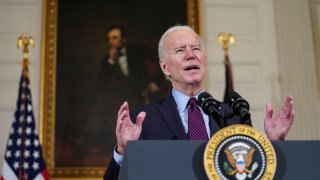
- President Joe Biden said he was supportive of Democrats' move to advance his American Rescue Plan through Capitol Hill without GOP support.
- Both the House and the Senate are trying to pass a coronavirus relief bill using a budgetary tool that would allow passage based on a simple majority.
- "What Republicans have proposed is either to do nothing or not enough," Biden said. "All of a sudden, many of them have rediscovered fiscal restraint."
President Joe Biden on Friday defended his administration's $1.9 trillion Covid stimulus plan and warned that Republican efforts to pass a smaller bill would only prolong the economy's trek back to full employment.
Biden, who spoke from the White House, said he was supportive of congressional Democrats' move to advance his American Rescue Plan without bipartisan backing.
Get top local stories in Philly delivered to you every morning. >Sign up for NBC Philadelphia's News Headlines newsletter.
"I'd like to be doing it with the support of Republicans. I've met with Republicans ... but they're just not willing to go as far as I think we have to go," Biden said.
"If I have to choose between getting help right now to Americans who are hurting so badly, and being bogged down in a monthly negotiation or compromising on a bill that's up to the crisis, it's an easy choice," he added.
The president's comments came as both the House and the Senate look to pass a coronavirus relief bill within two weeks using a budgetary tool that would allow Democrats to muscle through the $1.9 trillion plan without any GOP votes.
Money Report
The Senate passed a budget resolution early Friday after a marathon of votes on dozens of amendments. The House plans to follow suit in the afternoon.
But Biden, flanked by Vice President Kamala Harris and Treasury Secretary Janet Yellen, said Friday that he would have preferred to work with Republicans had they not insisted on a far smaller, $600 billion proposal.
The White House had at first said it would be willing to find areas of compromise on its $1.9 trillion proposal in exchange for enough GOP support to pass the Senate with 60 votes.
But the $618 billion rebuttal from a group of moderate senators including Mitt Romney of Utah and Susan Collins of Maine proved too small for Democrats to accept.
But the critiques haven't only come from Republicans.
Former Treasury Secretary and Obama National Economic Council Director Larry Summers warned in a Washington Post op-ed Thursday that the size of the bill could spark unexpected inflation as well as limit Biden's political capital for future legislation.
The president appeared to have little sympathy for fear of fiscal overextension.
"What Republicans have proposed is either to do nothing or not enough," Biden said. "All of a sudden, many of them have rediscovered fiscal restraint and concern for the deficits. But don't kid yourself, this approach will come with a cost."
"More pain for more people for longer than it has to be," he added.
In arguing against the size of the nearly $2 trillion package, Republicans have latched on to a recent report from the nonpartisan Congressional Budget Office that found U.S. GDP growth is expected to return to its pre-pandemic size by mid-2021.
The CBO, which published its findings on Monday, said U.S. economic growth will recover "rapidly" and the unemployment rate could fall to 5.3% from its current 6.3% this year. Importantly, the agency said its rosier projections do not assume any new stimulus, including Biden's $1.9 trillion plan.
Biden, however, highlighted a different finding in the CBO's report: Without additional stimulus, the economy would return to full employment by late 2024.
"We don't have to wait until 2025 to get back to full employment," the president said. "To me, this is what this moment comes down to: Are we going to pass a big enough package to vaccinate people, to get people back to work, to alleviate the suffering in this country this year?"






